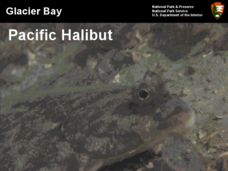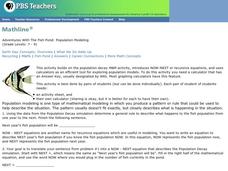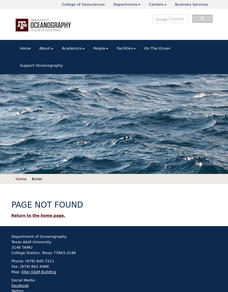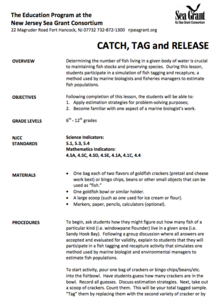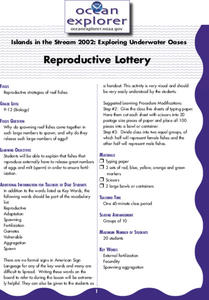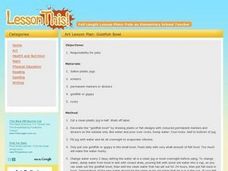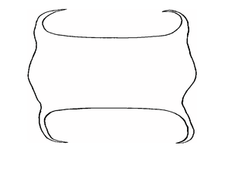Curated OER
A Fish Tale
Students conduct an experiment. In this fish lesson, students discover how fish cells respond to fresh and salty water and if temperature effect the movement of a fish's gills. Students also identify the characteristics of a fish.
Curated OER
A Fish Tale
Learners investigate the lives of fish. In this biology lesson plan, students demonstrate how fish cells respond to fresh and salty water, determine the age of a fish and if temperature effects the movement of a fish's operculum (gill...
California Academy of Science
Fish Forms
I've said it before, and I'll say it again, you can add art to any lesson! While little learners are discovering why fish have specific body parts such as, scales, fins, and gills, they start making three-dimensional fish forms. Children...
Curated OER
Glacier Bay Pacific Halibut
The National Park Service has produced a high-quality presentation on the halibut population of Glacier Bay, Alaska. It takes the viewpoint of the marine biologists or rather, ichthyologists, who have been studying the adaptations,...
PBS
Adventures With The Fish Pond: Population Modeling
Build up from the previous activity where your learners charted the population growth and decay of a fish pond with M&Ms®. Have them look at the data from that activity and create a Now-Next, or recursive equations, to predict the...
Polar Trec
Rings of Life
Individuals analyze tree rings to determine the health of an ecosystem. They then look at otoliths of fish, hard calcium carbonate structures located behind the brain, in the same manner.
Curated OER
Fisheries
Students research and report on the ocean's problems of disappearing or diminishing species around the world. students examine ecosystems and food chains and present their findings to a mock panel of science experts.
Curated OER
Something's Fishy!
Students experience center activities to explore the habits and traits of fish. They observe a goldfish, play a memory game, complete artwork and read about fish.
Curated OER
Catch, Tag, and Release
Learners discover how fish tagging is used by marine biologists and fisheries to estimate fish populations. Participating in a simulation, students use estimation to determine the whole population from a small number of items.
Curated OER
Floating Fishes: Boat Sinking Lab
Cut milk cartons in half to make boats and let investigators attempt to sink them. They add dividing walls and observe what happens if marbles are put into only one of the newly formed compartments. Vocabulary is provided: buoyant force,...
Florida International University
Counting FishStix
How do we count the fish in the ocean? An engaging lesson models how to estimate fish populations with observational surveys. Class members begin by studying the behavior of fish on the coral reef in the oceans. They...
Howard Hughes Medical Institute
Icefish Blood Adaptations: Antifreeze Proteins
Ever wonder how fish survive in freezing cold water—especially Antarctic waters? Some fish have an adaptation that lowers the freezing point of their life fluids. Learners model these adaptations in two lab explorations. The first...
Curated OER
Reproductive Lottery
Students explain that fishes that reproduce externally have to release great numbers of eggs and milt (sperm) in order to ensure fertilization.
Zebrafish in the Classroom
Worksheet on Genetics for Kindergarteners
Introduce the concept of genetics to your kindergartners with a science experiment about chromosomes in fish. After a quick overview of what chromosomes are, learners color different chromosomes to show that they come from the mom or the...
Curated OER
Physical Changes Pre-Quiz
Quiz the class on what they know before you teach it. This assessment will give you an idea of what basic scientific concepts are known to your learners. Physical change, state of matter, and basic plant and animal needs are covered.
Curated OER
Something's Fishy
Students study fish habits and traits. In this marine life instructional activity, students complete four learning centers of a fish memory game, a fish habitat study, draw and glue fish craft activity, and a fish read-a-thon. Students...
Curated OER
Cut Ice Cubes in Half Like Magic
Young scholars explore the process of melting or cutting ice. In this scientific observation lesson, students discover that the pressure from two weights will pull a string through an ice cube by melting the ice directly under the line...
Curated OER
Goldfish Bowl
Students discover proper pet care by creating a home for a fish. In this pet responsibility lesson, students create a goldfish bowl by cutting a plastic jug in half and decorating it with markers and stickers. Students are...
Curated OER
The Deep
In this deep ocean worksheet, students answer twenty questions after watching a video about the species that live in the deep ocean. Topics include jelly fish, hatchet fish, anglers, tubeworms, sea urchins, and plants that grow in deep...
Curated OER
I Won't Live in a Toxic World
Students examine four separate environmental health issues using fish-bowl technique, and discuss roles of both government and citizens in maintaining a pollution-free environment.
Curated OER
Skates
Students gain understanding of structure, characteristics, and basic needs of living things and their role in world, identify parts of skate, observe details of skate's body and skate egg case, and identify unique characteristics of skates.
Curated OER
Balloon Staging
Students explore rocketry using balloon rockets. They demonstrate how rockets can achieve greater altitudes by using the technology of staging. By using two inflated balloons that slide along a fishing line, they simulate a multistage...
Curated OER
Predator-Prey Relationships
Students explore the interrelatedness of predators and prey in four different activities. They simulate an aquatic insect, fish, and osprey food chain during a poker chip game, play an M&M game to simulate the relationship between...
Curated OER
CATCH, TAG and RELEASE
Students apply estimation strategies for problem-solving purposes. They become familiar with one aspect of a marine biologist's work.



